Are you wondering how to clean all-on-4 dental implants? If you are, you've come to the right place. All-on-4 dental implants, a type of implant-supported denture, require special care to ensure they last a lifetime and that your oral health stays tip-top.
So, it's important to know the right way to clean them. The good news is there are some steps you can incorporate into your daily oral hygiene routine.
These steps include water flossing, regular flossing, rinsing with mouthwash, and using a special sulcus brush — don't worry, this article will discuss what that is and more.
Keep reading to find out:
- How to clean permanent implant dentures
- The best products to use
- Dentist-approved tips and tricks
We hope this information helps you keep your smile clean, beautiful, and healthy.
The following tables summarises all of the products that we will discuss in this article:
Best Products for Cleaning All-On-4 Dental Implants | ||
Tepe Implant Brush 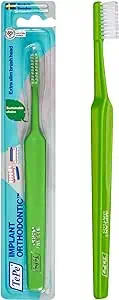 |
| |
Colgate PerioGard mouthwash  |
| |
Oclean W10 waterflosser |
| |
Oral B Super Floss 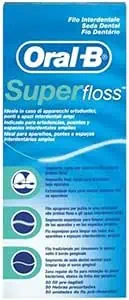 |
| |
Tepe Compact Single Tuft Brush  |
| |
In This Article
How to clean permanent implant dentures: 5 easy steps
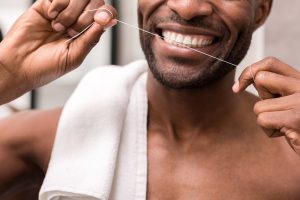
- Brush twice daily: Just as you would with natural teeth, you need to brush your new teeth twice daily. To do so, use a high-quality, soft-bristled toothbrush — manual or electric is fine. Brush your teeth for 2 to 3 minutes, using a gentle circular motion. Don't forget to brush along the gumline at a 45-degree angle.
- Use a water flosser: Use the medium or low setting to water floss between your teeth and under the bridge of your implants. You can aim the water from the lip or tongue side of your teeth — whichever is most comfortable for you.
- Floss under the bridge: You should floss at least once daily under the bridge. You can use a product like Super Floss from Oral-B, which has a stiff end and a fluffier middle, or a floss threader.
- Use a sulcus brush: A sulcus brush is 1/3 the width of a normal toothbrush and is great for cleaning along the line between the bridge and your soft tissue.
- Rinse with an antiseptic mouthwash: A mouthwash like Colgate's Peroxyl can be used daily to wash away smaller particles from under the bridge and decrease irritation and swelling.

Best all-on-4 implant cleaning products
Toothbrushes
TePe is known for its interdental brushes, but they also make a special implant toothbrush. This brush features an extra narrow brush head and a thin neck. The super-slim head design allows it to better clean small cracks and crevices.
The extra-soft bristles are aligned in two rows for better access to the gum line and the base of the implants. The neck is also flexible so it can be angled when run under hot water. This also makes it easier to access the gumline.
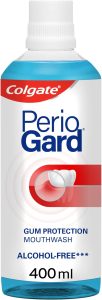
Mouthwash
You can use an antiseptic mouthwash daily to soothe inflammation and wash away any debris that might still be left over after you've brushed and flossed.
Colgate's PerioGard mouthwash is designed specifically to soothe oral sores and other irritation, including those caused by dentures and other oral appliances.
It's made with an alcohol-free formula so you don't have to worry about that harsh burning sensation. The dual active ingredients stannous and fluoride established with zink phosphate have a lasting antibacterial effect.
As an added bonus, its mild mint flavour will leave your breath delightfully fresh.
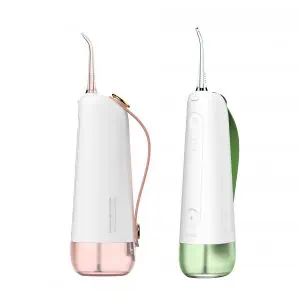
Water flossers
Oclean makes a water flosser that features 4 speciality flossing tips, including a periodontal pocket nozzle which works perfectly for dental implants. There are also 5 different flossing modes — powerful normal, standard normal, sensitive normal, pulse mode, and direct shooting mode, so you can choose the one that best fits your needs.
The 360-degree rotating tip also makes it easy to clean your implant bridge from either the front or the back. This flosser also has a waterproof design for use in the shower and lasts for 30 days on a single charge.
Floss

If you've ever had braces, you might already be familiar with Oral-B Super Floss. This floss is designed for use with braces, implants, and any other fixed appliances you might have in your mouth.
It works so well with appliances because it features a firm dental floss threader on one end, a section of spongy floss to grab more food particles, and a section of regular floss.
Here's what one reviewer has to say about using it for bridges:
“These are the best floss to get under a bridge. They thread nicely and have a slightly fluffy area that helps to make sure that anything under the bridge is cleaned out. “

Single tuft brush
A single tuft brush, as the name suggests, features a small brush head with a single tuft of bristles. These do wonders for cleaning around crowns, bridges, and implants, as they are designed to clean along the gum line to remove plaque and improve gum health.
The single tuft brush is angled to reach the top or bottom arches and comes with 3 replacement tips for each end of the handle.
It's a simple product but is a great way to keep up your gum health when you have all-on-4 implants.
What happens if you don't clean all-on-4 dental implants?
There are various complications that can develop if you don't keep your implants clean. In an article for DentistryiQ, Dr John A. Hodges describes how one patient developed speech issues and pain in her gums.
Dr Hodges removed her bridge to find that there was a buildup of food debris which caused the patient to develop a fungal infection. This was thanks to a combination of poor surgical preparation for dental restoration and poor oral hygiene.
Not cleaning your bridge will eventually lead to some sort of infection, with symptoms like bad breath, pus, bleeding, pain, swelling, and fever. Eventually, your implants can become loose and even fall out.
In other words — clean your implants. Not doing so can lead to implant failure and severe oral health problems.
Frequency of dental cleaning appointments
When you have implant-supported dentures like all-on-4 implants, it's likely that you'll need to visit your dentist more often than you normally would, to ensure everything is functioning as it should. Your dentist will tell you how frequent your visits should be, but in general, plan on making appointments at 3-month intervals for hygiene visits.
During these visits, the dental hygienist will check for gum disease and look for any other factors that might promote disease or infection. They will also give your bridge a good clean, using special scaling tools, and let you know if there's anything you should adjust in your daily oral hygiene routine.
Conclusion
It's critical to keep your all-on-4 dentures clean — equally so as it is to keep natural teeth clean. If you don't, you are likely to develop an infection, leading to all sorts of health problems.
What's more, if you have an infection in your gums, your dental implants could loosen and fall out after a while.
It's true that your dental implants will require a bit of extra care than you might typically take with natural teeth. But it's important that you make the steps above a part of your daily oral hygiene routine.
Above all:
- Brush twice daily
- Floss at least once daily
- Use an antiseptic mouthwash
FAQs
How do you floss all-on-4 implants?
Flossing all-on-4 implants isn't the same process as flossing a single implant, or a natural tooth. In general, the technique involves pulling the floss in between the implant bridge and the gum line.
This video shows how it works:
How do you clean under dental implants?
You can clean under dental implants using a combination of dental floss, water flossers and mouthwash. It's important to use all of these so that no food particles are left behind.
DentistryiQ: Hygiene protocol for full-arch All-on-4 fixed bridges. Consulted 12th October 2022.





